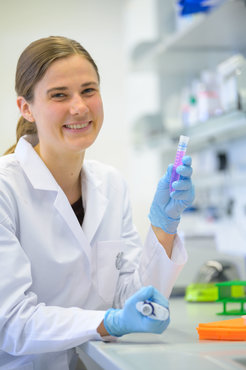Marieke Oudelaar honored by Bayer Foundation
The scientist at the Max Planck Institute (MPI) for Multidisciplinary Sciences in Göttingen (Germany) received the Bayer Early Excellence in Science Award in the category biology. With this prize, she is honored for her successful research into the spatial organization of DNA and its relationship with gene activity. The award ceremony took place on March 15 as a hybrid event in Berlin (Germany).

The Bayer Foundation Science Council based its decision on the outstanding contributions Oudelaar made in the development of methods that characterize the organization of the genetic material. All cells of an organism carry the exact same genetic information, which is encoded in the DNA. Nevertheless, they are specialists which perform highly specific tasks: Immune cells work as the body’s defense system. Nerve cells perceive and transmit information. Skin cells protect us from mechanical influences and regulate our body temperature. How can this be? The answer: Different cell types activate and use different DNA segments, called genes, which provide the information to produce proteins. However, basic mechanisms of this DNA regulation are yet to be explored.
“We want to understand how cells manage to turn certain genes on and off and how this process is regulated,” explains the Lise Meitner group leader. “In particular, we are interested in how gene activity relates to the spatial organization of the DNA in cells.” If the DNA of a single cell was stretched out to its full length, it would be about two meters long. In order to fit inside the tiny cell nucleus, it must fold up in specific three-dimensional structures. These 3D structures affect whether signals from the cell can activate genes in the DNA. “We succeeded in improving methods with which we can study the spatial organization of regions of interest in our DNA, so that we can analyze these 3D structures in more detail,” Oudelaar says. “We also improved the efficiency of some of these methods. Initially, we needed millions of cells to get useful data. Now we are down to a few thousand.” This is an important step that will facilitate the analysis of disease-causing cell types.
“Disruptions in gene activation, for example, can contribute to cancer. If we learn more about the links, we may find ways to treat or someday even prevent such diseases,” the scientist explains. “The award is a great motivation to continue research in this exciting field.” (kr)
About the awardee
After studying biomedicine, the Dutch scientist completed her PhD at the University of Oxford (United Kingdom) in 2018. There, she continued her work as a postdoctoral researcher for two more years. Since 2020, Oudelaar has headed the first Lise Meitner Group Genome Organization and Regulation at the MPI for Multidisciplinary Sciences. The Lise Meitner Excellence Program launched by the Max Planck Society in 2018 annually selects exceptionally qualified female scientists to support them in their research and to appoint more female directors within the society in the long term. In addition to material and personnel resources, the female scientists are given the opportunity to take up a senior scientific position at an early stage.
About the Bayer Early Excellence in Science Award
Since 2009, the Bayer Foundation has been awarding the international prize to outstanding young scientists in the categories biology, chemistry, medical sciences, and data science in the life sciences. The award is given to outstanding researchers who completed their doctorate within the last five years and whose research has already significantly contributed to their distinguished fields of science. The Foundation’s Science Council selects the award winners from an extremely competitive list of globally nominated candidates. The prize is awarded annually with a prize money of 10,000 euros.
